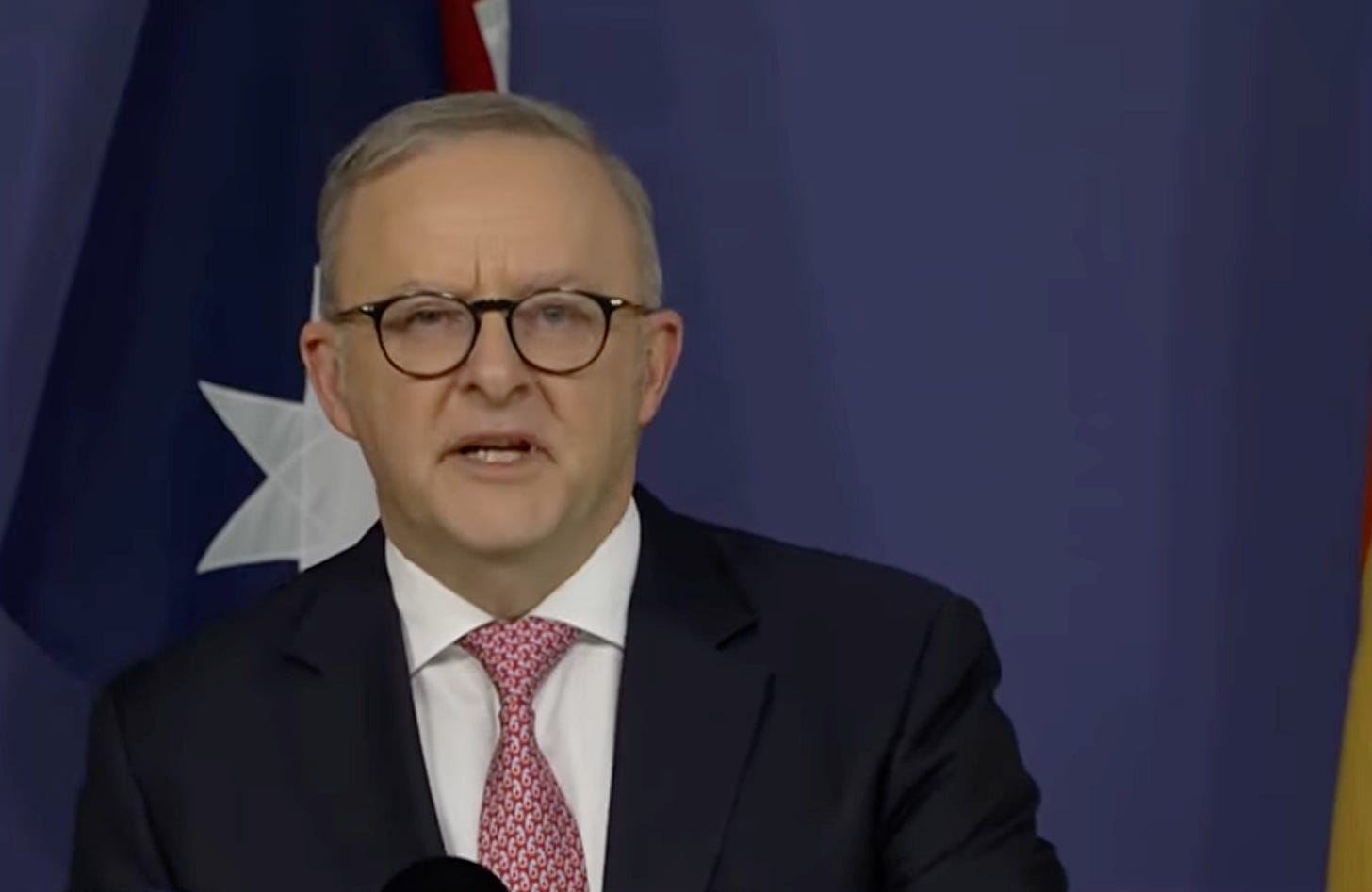Prime Minister Receives 54 Recommendations to Combat Surging Islamophobia
Today’s email is brought to you by Empower your podcasting vision with a suite of creative solutions at your fingertips.
Prime Minister Anthony Albanese Tuesday accepted a comprehensive report calling for sweeping government action to address what officials describe as a 150% surge in anti-Muslim incidents since the October 7, 2023 attacks in Israel.
The report from Australia's Special Envoy to Combat Islamophobia contains 54 recommendations spanning multiple federal departments and proposes establishing commissions of inquiry into both Islamophobia and anti-Palestinian racism.
Special Envoy Aftab Malik presented the findings during a press conference at Parliament House, detailing alarming statistics and recent incidents that underscore what he called an "unprecedented" escalation of anti-Muslim hatred.
"Since October 7, 2023, Islamophobic incidents have skyrocketed," Malik said. "The Islamophobic Register has recorded a 150% increase in verified in-person Islamophobic incidents by November 2024. Online, these instances skyrocketed to 250% compared to any other period before that."
The timing of the report's release follows a particularly volatile week for Muslim communities. Malik cited a fake bomb left outside a Gold Coast mosque and the evacuation of 1,700 students from Queensland's largest mosque due to a bomb threat as recent examples of escalating tensions.
"Here in Sydney, the Islamophobia Register recorded an alleged incident in which a 55-year-old Arab man was repeatedly punched in the face while he was waiting at a bus stop," Malik said, describing an attack that allegedly included Islamophobic slurs.
Truth matters. Quality journalism costs.
Your subscription to Mencari directly funds the investigative reporting our democracy needs. For less than a coffee per week, you enable our journalists to uncover stories that powerful interests would rather keep hidden. There is no corporate influence involved. No compromises. Just honest journalism when we need it most.
Not ready to be paid subscribe, but appreciate the newsletter ? Grab us a beer or snag the exclusive ad spot at the top of next week's newsletter.
Government Response Cautious
Albanese emphasized that his government had not yet reviewed the independent report but committed to careful consideration of its recommendations.
"What we'll do is examine it in a considered way," Albanese said. "My government has not had the opportunity to consider this, but it's an independent report as well."
The Prime Minister defended his administration's track record on combating religious discrimination, citing $25 million allocated this year to enhance security at mosques, Islamic centers and schools, plus additional funding for community programs and cultural institutions.
Minister for Multicultural Affairs Anne Ali praised Malik's work in documenting experiences of discrimination across Australian Muslim communities.
"What Aftab has done with this report is to give voice to Muslims across Australia who have long endured discrimination, racism and at times some pretty abhorrent acts of just outright hatred and often without a form of recourse," Ali said.
Comprehensive Recommendations Span Government
The 47-page report, titled "A National Response to Islamophobia: A Strategic Framework for Inclusion, Safety and Prosperity," presents recommendations organized around four key areas: accountability and responsibility, protection and support, education and awareness, and building social cohesion.
Major proposals include establishing oversight mechanisms within the Department of Prime Minister and Cabinet, mandatory religious sensitivity training for Australian Federal Police officers, and comprehensive anti-racism frameworks for educational institutions.
The report calls for Parliamentary Joint Committee on Human Rights to establish separate commissions of inquiry into both Islamophobia and anti-Palestinian racism, acknowledging what Malik described as distinct but intersecting forms of discrimination.
"Anti-Palestinian racism is distinct from Islamophobia for two fundamental reasons," Malik explained. "Islamophobia encompasses Afghans, Pakistani, Yemenis, Iraqis, white Muslims, Caucasian Muslims. But anti-Palestinian racism is focused specifically on Palestinians, and it has a sinister undertone to erase and eradicate anything to do with their heritage or culture."
Statistical Evidence of Rising Hatred
Malik's consultations with more than 100 Muslim community members between November and December 2024 revealed widespread experiences of discrimination, violence and harassment intensifying over the past year.
The report cites polling data showing more than one in three Australians express negative attitudes toward Muslims, an increase from 27% the previous year. Historical data referenced indicates 50% of Australians self-identified as anti-Muslim in a 10-year study published in 2011.
"A 2020 study found that 41% of mosques in Sydney, 70% in Melbourne and 89% in Brisbane had experienced attacks or threats," Malik said, outlining the scope of documented incidents.
The 2019 Christchurch terror attacks, carried out by an Australian citizen who killed 51 Muslims, led to a fourfold increase in Islamophobic incidents in Australia and an 18-fold increase online, according to the report.
Religious Discrimination Legislation Stalled
When pressed about federal religious discrimination protections, Albanese acknowledged the challenge of achieving bipartisan support for such legislation.
"I think given where we're at in 2025, the idea that we would have a partisan debate in the Parliament could actually lead to more division," Albanese said. "We expect parties of government to be supportive of such a reform."
The Prime Minister noted that previous religious discrimination legislation passed the House of Representatives but was shelved by the former Morrison government.
Malik emphasized that his recommendations would extend religious protections to all faith communities, including Christians, Muslims, Buddhists, Jews and Sikhs.
Community Impact and Response
The report documents the personal toll of rising anti-Muslim sentiment, with Malik describing incidents targeting women wearing headscarves and children facing threats.
"In a repulsive incident recorded by the Australian Human Rights Commission, a man told a Muslim couple that he would love to kill their three children, all who were under the age of 10," Malik said.
During his national listening tour, Malik said he encountered widespread experiences of isolation, exclusion and disenchantment among Muslim Australians.
"The evidence aligns with what Muslim communities of Australia have shared with me, and that is Islamophobia is not only interpersonal. It is also institutional and structural," he said.
Historical Context and Global Events
The report traces rising anti-Muslim sentiment to global events beginning with the September 11, 2001 attacks, escalating through subsequent international incidents including the Bali bombings, Charlie Hebdo attacks and the Syrian refugee crisis.
Malik referenced the 2005 Cronulla riots as a domestic flashpoint that demonstrated the real-world consequences of anti-Muslim rhetoric.
"Violence, assault, and vile racism, along with derogatory statements written into the sand of the beach and on the bodies of rioters, pushed the overt message that Australian Muslims and Arabs were not welcome here," he said.
The current escalation follows what Malik described as anti-Palestinian sentiment that "makes no distinction between Muslim and Arab, Islam or Christianity."
Implementation Timeline Uncertain
While the report provides detailed recommendations across 11 federal departments and agencies, no specific implementation timeline was announced. Albanese emphasized the need for thorough government consideration before committing to specific actions.
The Prime Minister acknowledged existing government initiatives, including establishment of the first national database to track hate crimes and incidents, developed in coordination with state and territory attorneys general.
"We have been consistent," Albanese said, defending his government's broader approach to combating hate speech and religious discrimination across all communities.
The report's release comes as Australia grapples with rising tensions related to international conflicts, with Malik describing this as "a historic opportunity" to address systemic discrimination against Muslim Australians.
"Not too long from now, I hope that we are able to look back at this historic moment and see it as a turning point for addressing Islamophobia and turning words into meaningful action," Malik concluded.
Sustaining Mencari Requires Your Support
Independent journalism costs money. Help us continue delivering in-depth investigations and unfiltered commentary on the world's real stories. Your financial contribution enables thorough investigative work and thoughtful analysis, all supported by a dedicated community committed to accuracy and transparency.
Subscribe today to unlock our full archive of investigative reporting and fearless analysis. Subscribing to independent media outlets represents more than just information consumption—it embodies a commitment to factual reporting.
As well as knowing you’re keeping Mencari (Australia) alive, you’ll also get:
Get breaking news AS IT HAPPENS - Gain instant access to our real-time coverage and analysis when major stories break, keeping you ahead of the curve
Unlock our COMPLETE content library - Enjoy unlimited access to every newsletter, podcast episode, and exclusive archive—all seamlessly available in your favorite podcast apps.
Join the conversation that matters - Be part of our vibrant community with full commenting privileges on all content, directly supporting The Evening Post (Australia)
Catch up on some of Mencari’s recent stories:
It only takes a minute to help us investigate fearlessly and expose lies and wrongdoing to hold power accountable. Thanks!








